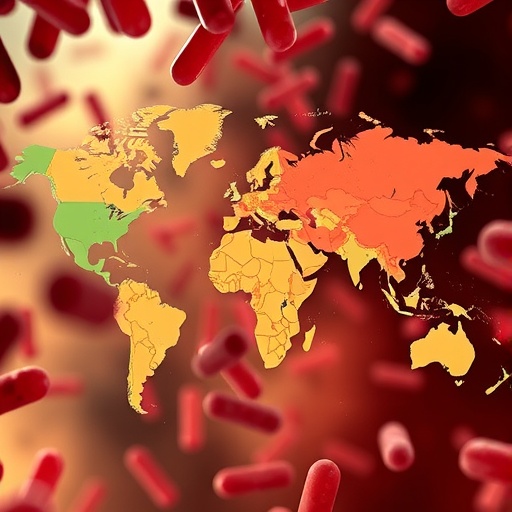
In the wake of Russia’s full-scale invasion of Ukraine, a significant and concerning medical challenge has emerged among refugees seeking care in European nations. Recent research conducted by the University of Helsinki in collaboration with HUS Helsinki University Hospital reveals that war-injured Ukrainian refugees bear alarmingly high rates of multidrug-resistant (MDR) bacteria colonization. This finding exposes a hidden but potent public health threat linked directly to the conditions experienced by patients hospitalized in conflict zones.
The study, which employed rigorous data and statistical analysis methodologies, highlights a stark dichotomy between refugees hospitalised due to war injuries and those who were not. Approximately eight percent of Ukrainian refugees transferred to Finland had sustained injuries requiring hospitalization caused by the war. Among these patients, nearly 80% were found to carry multidrug-resistant bacteria, a fact that raises urgent concerns for infection control and antimicrobial stewardship in receiving healthcare systems.
These multidrug-resistant bacteria present a formidable clinical challenge. MDR pathogens are resistant to multiple antibiotics, thereby severely limiting treatment options and increasing morbidity and mortality risks from infections. The fragility of healthcare infrastructures within war-afflicted regions like eastern Ukraine exacerbates the problem. Hospitals face overburdened conditions with compromised infection prevention mechanisms, creating ideal environments for the dissemination of highly resistant bacterial strains.
.adsslot_IMJv1jN2Hr{width:728px !important;height:90px !important;}
@media(max-width:1199px){ .adsslot_IMJv1jN2Hr{width:468px !important;height:60px !important;}
}
@media(max-width:767px){ .adsslot_IMJv1jN2Hr{width:320px !important;height:50px !important;}
}
ADVERTISEMENT
Professor Anu Kantele, leading the investigation at the University of Helsinki, underscores the specificity of this risk. The increased prevalence of MDR bacteria is not uniformly distributed among all refugees but is heavily concentrated among those who experienced hospitalization in conflict zones. Patients without prior hospitalization abroad or those who evacuated before sustaining severe injuries carry notably lower rates of resistant bacteria. Their bacterial colonization resembles that of typical travelers returning from regions known for MDR prevalence, such as Asia or Africa, primarily involving extended-spectrum beta-lactamase (ESBL) producing Escherichia coli and isolated cases of methicillin-resistant Staphylococcus aureus (MRSA).
From a microbiological perspective, the MDR bacteria carried by war-injured patients often include critical priority pathogens. These organisms possess genetic resistance determinants enabling survival against numerous antibiotic classes, including beta-lactams, carbapenems, and fluoroquinolones. The situation is worrying because these resistant bacteria frequently cause severe wound infections, sepsis, and other invasive infections that are challenging to treat and contain.
The study’s findings resonate with previous global concerns about antimicrobial resistance (AMR) as a growing “silent pandemic.” War-torn environments are particularly conducive to accelerating AMR’s spread. Hospitals inundated with casualties, scarcity of resources, inadequate sanitation, and disruption to microbiological surveillance collectively facilitate the selection and transmission of resistant pathogens within and beyond national borders.
One crucial aspect revealed by the research is that ordinary citizens and non-hospitalised refugees do not need to fear an increased risk of MDR bacterial carriage. According to Doctoral Researcher Tuomas Aro, who specializes in infectious diseases, the issue is confined mainly to hospital environments where the convergence of extensive antibiotic use and inadequate infection control creates high-risk reservoirs of resistance.
This nuanced understanding helps public health officials tailor appropriate interventions. In Finland, the healthcare system has proactively instituted protocols to mitigate the imported AMR threat posed by war-injured patients. These measures include isolating patients who had prior hospitalization abroad in single rooms with strict contact isolation procedures, alongside prompt bacterial screening upon admission. Early detection and containment reduce the potential spread within hospital wards and the broader community.
On a broader scale, this research highlights the need for increased international collaboration in AMS (antimicrobial stewardship) and infection prevention measures, especially for displaced populations crossing multiple healthcare jurisdictions. The data offer critical evidence supporting enhanced screening guidelines and tailored infection control practices in European hospitals admitting patients from conflict zones.
The University of Helsinki and HUS Helsinki University Hospital’s study also emphasizes the importance of maintaining and strengthening healthcare infrastructures during conflicts. Investment in adequate infection control protocols, availability of diagnostic microbiology, and access to effective antibiotics must be prioritized to stem the rising tide of AMR in war-affected populations.
With the globalized nature of refugee movements and medical repatriation, these findings serve as a clarion call to vigilance. Multidrug-resistant bacteria do not respect borders, and hospitals worldwide must prepare for the complex challenges posed by treating severely injured patients carrying resistant infections. This study provides a vital epidemiological snapshot and forms a foundation for future research and policy planning aimed at mitigating the impact of antimicrobial resistance linked to armed conflicts.
As antimicrobial resistance continues to be labeled a worldwide health crisis, understanding specific vectors of transmission—such as war injuries—allows for more precise and effective healthcare interventions. The integration of clinical microbiology, epidemiology, and infectious disease expertise exemplified by this research represents an essential approach to combating the evolving AMR landscape in the 21st century.
To conclude, the University of Helsinki’s pivotal study sheds light on the hidden microbial dangers confronting war-injured Ukrainian refugees. It simultaneously offers reassurance that the risk is largely contained within hospital environments and does not extend broadly to the general refugee population or the host country’s community. Nonetheless, it underscores the urgent need for meticulous infection control and global solidarity in addressing the ongoing war on antimicrobial resistance.
Subject of Research: People
Article Title: War on AMR: High MDR carriage rates among war-injured Ukrainian refugees
News Publication Date: 21-Jul-2025
Web References: 10.1016/j.cmi.2025.07.010
Keywords: antimicrobial resistance, multidrug-resistant bacteria, MDR, war injuries, Ukrainian refugees, infection prevention, healthcare-associated infections, ESBL-producing E. coli, MRSA, antimicrobial stewardship, microbial epidemiology, conflict zones
Tags: antimicrobial resistance in Europeconflict zone hospitalshealthcare infrastructure in conflictinfection control challengesinternational spread of infectionsmultidrug-resistant bacteriapublic health threat Ukrainerefugee health issuesrefugee medical care risksresearch on MDR pathogensUniversity of Helsinki studywar-injured refugees healthcare





